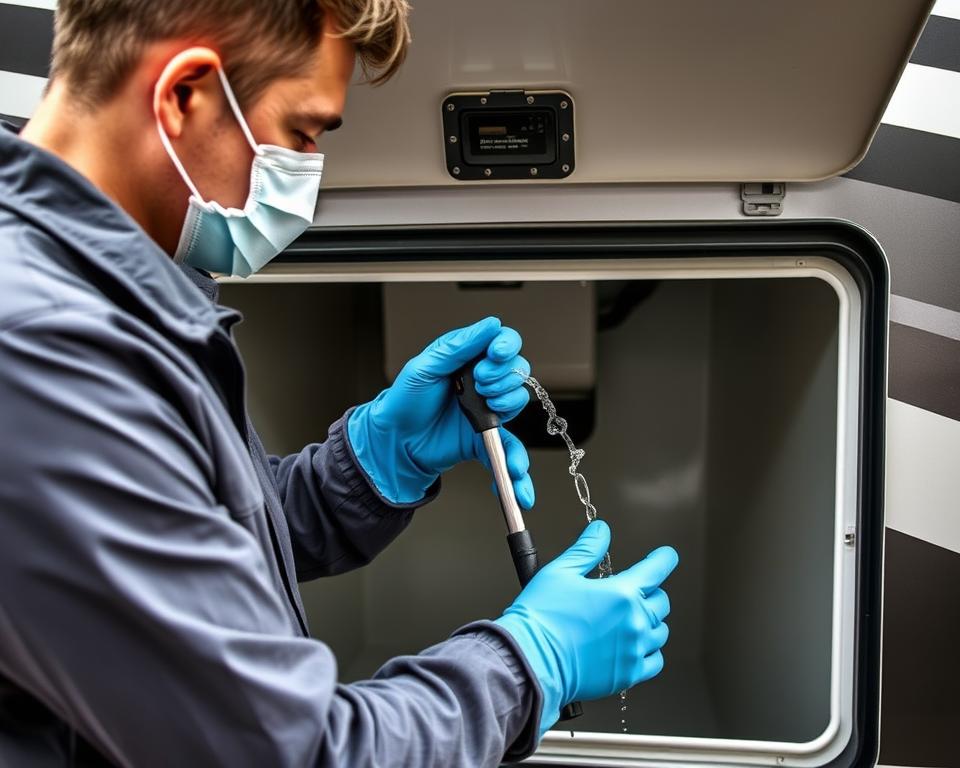Must-Know RV Septic Tank Service Care Tips
Have you ever considered what goes on to your RV’s Septic tank as you’re on the road? It’s not just steering clear of unpleasant scents. Caring for your RV Septic tank properly serviced helps secure smooth travels. A well-maintained system prevents messy incidents and costly fixes. Still, many neglect this vital care. In this guide, we break down the importance for regular RV sewer pump. We’ll highlight the value of upkeep and offer tips for cleaning your recreational vehicle’s Septic tank. Get ready for carefree adventures!
Critical Findings
- Scheduled RV Septic tank service is critical for top performance.
- Knowing your RV Septic system enables you to head off costly repairs.
- Routine maintenance stops unpleasant odors and clogs.
- Establish a pumping schedule matched with your usage.
- Use best practices for draining your holding tanks.
- Bypass common mistakes to prolong the life of your Septic system.
- Know when to seek professional help for Septic services.
RV Septic System Basics
An RV Septic system is key for any camper. It includes multiple holding tanks that process waste effectively. You’ll find three main tanks in an RV: the fresh water, the gray, and the black tank. The fresh water tank supplies clean water for drinking and cooking. Meanwhile, the gray tank collects wastewater from sinks and showers, maintaining cleanliness. The black tank, specifically for toilet waste, also has a vent to minimize odors.
Preserving a healthy camper sewage system requires recognizing how these parts work together. Frequent checks of the tank levels are essential to avoid overflow and secure everything runs properly. Getting to know the termination valves is crucial too. These valves are key in properly directing waste disposal. By familiarizing yourself with these components, you can keep your RV in top condition and enjoy your travels without extra stress.
| Holding Tank | Function | Volume |
|---|---|---|
| Fresh Water Tank | Supplies drinking and cooking water | 30-100 gallons |
| Gray Tank | Stores wastewater from sinks and showers | 30-60 gallons |
| Black Tank | Stores toilet waste | 30-50 gallons |
Why Routine RV Septic Tank Service Matters
Consistent RV Septic tank service is key to ensuring your system effective and long-lasting. Without adequate maintenance, you could face system failures, bad smells, and expensive repairs—issues that derail your adventures.
Overlooking the upkeep of your RV’s Septic system may cause it to back up. This not only impacts your RV’s function but also your comfort levels. A well-maintained and maintained system is vital for hassle-free trips, offering you a serene travel experience.

Scheduled maintenance lengthens your sewage system’s lifespan and maintains a clean living space. Keeping an eye on your Septic tank helps you spot issues early. This proactiveness saves costs and stress, providing you confidence during your journeys.
How Often to Pump Your RV Septic Tank
Figuring out the best schedule for RV Septic tank maintenance hinges on the vehicle’s usage. For those regularly on the road or living in their RVs, it’s advised to drain the black tank every three to five days. This practice keeps cleanliness and stops unexpected issues during voyages.
Weekend adventurers can typically wait until they return home to pump their Septic tank. Letting waste in the tank too long, though, can cause build-up that slows the tank’s function and smell control. It’s important to watch the tank’s level closely, readying for disposal once it hits ≈66% full to keep everything running properly.
The capacity of your Septic system, along with how you use your RV, will guide when to pump. Knowing these aspects improves your RV’s performance and minimizes the dangers of poor waste management.
| Usage Type | Ideal Pumping Cadence | Urgent Pumping Indicators |
|---|---|---|
| Frequent Usage | Every 3-5 days | Level reads 2/3 |
| Weekend Trips | After return home | Bad smells or lazy draining |
| Extended Trips | Every 2-3 days | Gauge shows near full |
Smart Tips for Draining RV Holding Tanks
Efficiently managing a recreational vehicle’s holding tanks is key for a comfortable camping experience. Start by draining the black tank first. This strategy enables the gray water to flow through and flush out the hose. Ensure the use of a high-quality sewer hose for a tight connection and to reduce spills. Once the tanks are emptied, thoroughly flushing the black tank is crucial. Employing a built-in black tank flush or comparable alternatives can dramatically cut residue.
After the emptying process, it’s essential to close both valves tightly. This action is vital to sustain a fully operational Septic system. Additionally, RV owners must utilize dump stations properly and adhere to local laws. Consistent cleaning practices for recreational vehicle Septic tanks are key. They preserve the system’s optimal functionality and avert future odors.
How to Stop RV Odors & Clogs
To manage odors and prevent clogs in your RV, being meticulous is key. The task begins with ensuring enough water in the holding tanks. Adequate water assists in breaking down waste efficiently, lowering bad smells.
Selecting suitable toilet paper is important in this process. Opt for RV-safe toilet paper that disintegrates quickly, preventing clogs. This simple adjustment greatly aids in maintaining seamless waste flow.
Using enzyme-based treatments can further improve waste decomposition and odor control. These bio solutions assist keep your RV smelling fresh. It’s also crucial to regularly examine vent pipes for obstructions to maintain good airflow and block odors from infiltrating your living area.
RV Septic Maintenance: Mistakes to Avoid
Keeping your RV’s Septic system correctly is essential for its efficiency and longevity. When non-biodegradable items like wipes or feminine products are flushed, they can cause severe blockages. These blockages can cause various problems that are hard to resolve.
Not using enough water when flushing can also hurt the system. It creates waste buildup, resulting in nasty scents and potential damage. Furthermore, a common mistake at full hook-up sites is leaving the black tank valve open. This causes waste to pool at the tank’s bottom.
Preventive measures include routinely flushing and rinsing tanks after emptying them. Ignoring maintenance can grow into significant issues demanding expensive repairs. Being prepared and knowledgeable helps both your RV and your finances.
Calling in the Pros for RV Septic Service
Recognizing when to seek professional RV Septic services is essential for keeping a healthy Septic system. Some indicators signal the need for expert intervention. Should you spot slow-draining tanks or get persistent foul odors wafting from your RV, it is wise to act promptly. These signs often reveal underlying issues that demand a thorough Septic tank service for resolution.
Visible leftover waste after emptying can also reveal problems within your Septic system. This situation may not fix with routine maintenance and may call for the use of specialized equipment. Professionals are equipped to handle complex challenges via tools, such as high-pressure water jets, to provide a thorough cleaning process.
Early professional assistance can make a significant difference. Small problems can quickly turn into more severe complications without proper care. Investing in professional RV Septic services preserves the integrity of your system and prolongs its lifespan.
| Warning Signs | What to Do |
|---|---|
| Slow draining tanks | Contact professional RV Septic services for assessment |
| Persistent foul odors | Schedule Septic tank service for diagnostics |
| Visible leftover waste | Seek immediate assistance from a professional |
| Frequent clogs | Consider expert cleaning solutions |
Sustaining RV Septic Performance Over Time
Long-term care for RV Septic systems demands attention beyond basic pump-outs. Performing deep cleaning of tanks every few months avoids buildup and lengthens system life. Checking dump valve seals on schedule stops leaks. Additionally, sanitizing the system keeps it clean and functioning well.
It’s crucial to monitor tank sensors to verify they work correctly. Incorrect readings may lead to over-filling, hurting performance. Periodic sensor checks and adjusting maintenance schedules can stop this problem.
| Action | Frequency | Benefits |
|---|---|---|
| Deep Cleaning Tanks | Every 3-6 months | Keeps flow smooth |
| Inspect Dump Valve Seals | Monthly | Reduces risk of leaks |
| Sanitize System | Every 6 months | Makes sure system remains clean |
| Monitor Tank Sensors | Monthly | Prevents over-fill |
Forward-thinking maintenance is vital to your RV Septic system’s long-term health. It lays the groundwork for enjoyable and carefree travel experiences.
All In Sanitation: Your Partner in RV Septic Solutions
All In Sanitation specializes at providing RV Septic services that meet each client’s distinct needs. Whether it’s scheduled pump-outs or thorough tank cleaning, they understand the essential role of a well-functioning Septic system in your RV’s performance.
With extensive expertise in RV Septic systems, All In Sanitation delivers top-tier guidance on maintenance and care. Their team is knowledgeable in the unique challenges RV owners face and offers effective solutions when troubles arise.
Opting for All In Sanitation lets RV enthusiasts dive in their journeys, entrusting Septic concerns to a reliable ally. Their dedication to excellent service delivers confidence and boosts the pleasure of adventures on the open road.
As a Final Point
Looking after your RV Septic tank is vital for seamless travels. It’s necessary to understand your system and keep up with regular services. This guarantees you won’t face unexpected issues on your journey. These key steps include frequent pumping and adopting sound waste management practices.
Proper long-term care keeps your system in top shape. By following the provided maintenance tips, you can improve your travel experience. This method guards against expensive repairs later. Bear in mind, steering clear of common errors and knowing when to obtain professional help are vital.
Bottom line, being prepared in your RV Septic system’s maintenance ensures a stress-free adventure. It allows you to concentrate on creating lasting memories. So, take these steps to heart and enjoy your road trips to their fullest.


